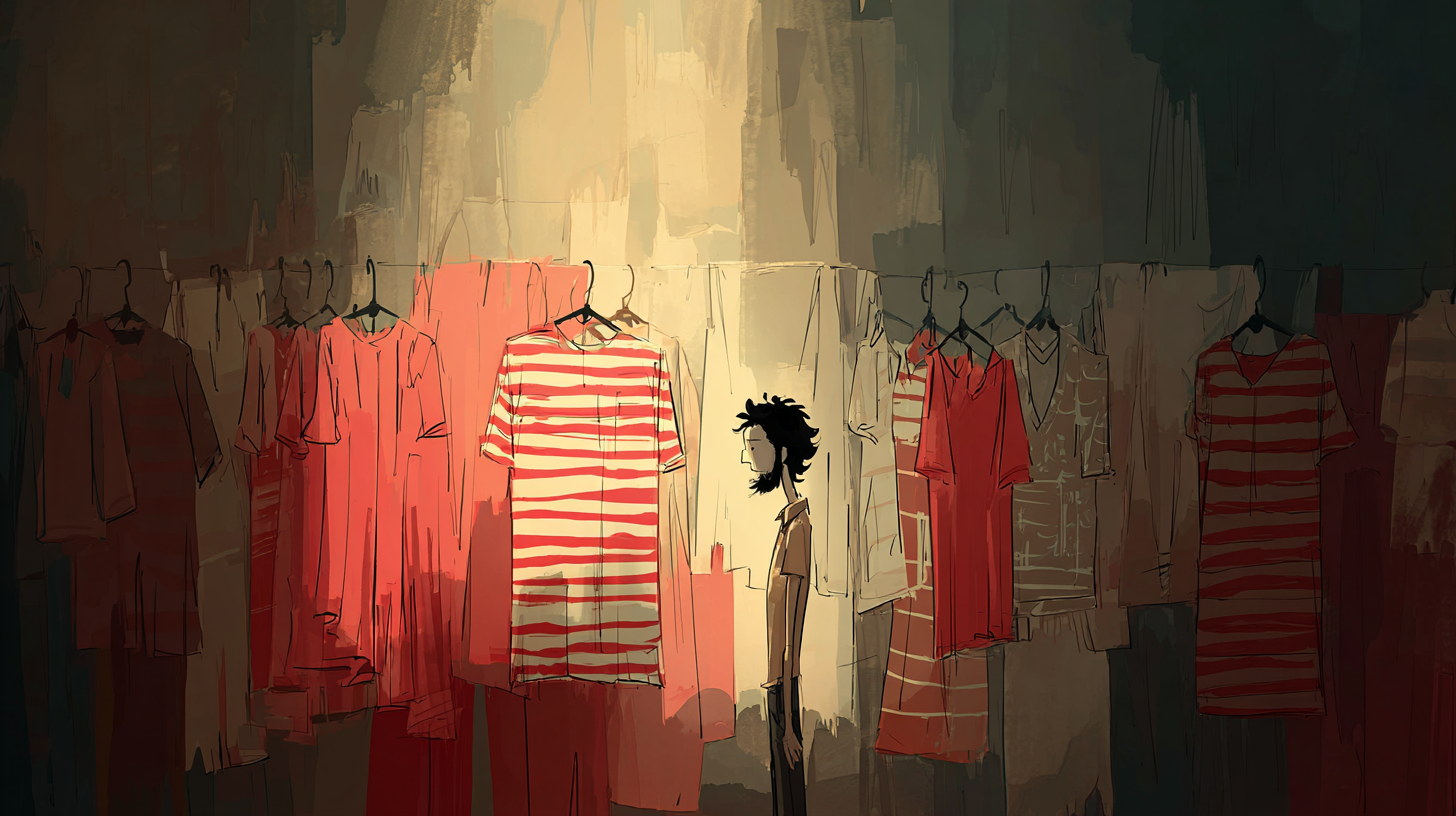A shirt is a piece of clothing you wear on the upper part of your body.
シャツは上半身に着る服のこと。
以下は英単語 “shirt” に関するストーリー型学習コンテンツです。まずは大枠の意味を理解して最後の文章で確認しましょう。
主な意味(main meaning)
| 品詞 | 発音記号(IPA) | 意味(簡潔) | 例文 |
|---|---|---|---|
| 名詞 | /ʃɜːrt/ | 上半身に着る衣服(特に長袖やボタン付き) | He wore a white shirt to the meeting. |
| 動詞(※比較的まれ) | /ʃɜːrt/ | シャツを着せる、シャツを着る | She shirted the baby before going out. |
語源(etymology)
「shirt」は古英語 scyrte(チュニック型の服)から来ており、さらに古ゲルマン語 skurtijō に由来します。核となるイメージは「上半身を覆う布の服」です。
類義語(synonyms)
| 類義語 | 例文 |
|---|---|
| blouse | She bought a new blouse for the party. |
| T-shirt | He prefers wearing a T-shirt in summer. |
| polo shirt | A polo shirt is comfortable for casual days. |
| tunic | The dancer wore a colorful tunic. |
反義語(antonyms)
| 反義語 | 例文 |
|---|---|
| pants | He bought new pants to match his jacket. |
| skirt | She wore a skirt instead of jeans. |
コロケーション(collocations)
| コロケーション | 例文 |
|---|---|
| dress shirt | He wore a dress shirt for the interview. |
| short-sleeved shirt | I bought a short-sleeved shirt for summer. |
| button-down shirt | A button-down shirt looks neat. |
| striped shirt | She wore a striped shirt to work. |
2項表現(binomials)
| 2項表現 | 例文 |
|---|---|
| shirt and tie | He always goes to work in a shirt and tie. |
| pants and shirt | I packed a pair of pants and a shirt for the trip. |
英語ストーリー(english story)
Tom worked in a small office in the city. Every morning, he wore a dress shirt and a tie to look professional. One Monday, as he was getting ready for work, he noticed a big coffee stain on his favorite white shirt. He quickly searched his closet for another one. There were many shirts: a striped shirt, a short-sleeved shirt, and even an old polo shirt.
He remembered he had an important meeting that day, so he chose a clean blue dress shirt. His colleague, Sarah, noticed it when he arrived. “Nice shirt,” she said. “Thanks,” Tom replied. “It’s new. I bought it because I didn’t have time to wash my old one.”
During lunch, they talked about clothes. Sarah said she preferred a blouse at work, but she sometimes wore a T-shirt on casual Fridays. Tom laughed, “I guess pants and shirts are my usual style.” They agreed that dressing neatly was important in their office.
After work, Tom stopped by a shop to buy another dress shirt, just in case. He thought, “It’s always good to have a spare shirt and tie for emergencies.”
和訳
トムは都会の小さなオフィスで働いていました。毎朝、彼は**ドレスシャツ(dress shirt:襟付きシャツ)とネクタイ(tie)を身につけ、きちんとした印象を与えていました。ある月曜日、仕事の準備をしていると、お気に入りの白いシャツに大きなコーヒーのシミを見つけました。急いでクローゼットを探すと、ストライプのシャツ(striped shirt)や半袖のシャツ(short-sleeved shirt)、さらには古いポロシャツ(polo shirt)**までありました。
その日は重要な会議があることを思い出し、彼はきれいな青いドレスシャツを選びました。職場に着くと同僚のサラがそれに気づき、「いいシャツね」と言いました。「ありがとう。新しいんだ。前のを洗う時間がなくてね」とトムは答えました。
昼食中、二人は服について話しました。サラは職場ではブラウス(blouse)を好むけれど、カジュアルフライデーにはTシャツ(T-shirt)を着ることもあると言いました。トムは笑って「僕はいつもズボン(pants)とシャツ(shirt)の組み合わせだな」と言いました。二人は、オフィスではきちんとした服装が大事だということで一致しました。
仕事の後、トムは予備のドレスシャツを買うために店に寄りました。「緊急時に備えて、予備のシャツとネクタイは必要だ」と彼は思いました。
Q&A
Q: “shirt” と “blouse” はどう違いますか?
A: “shirt” は男女どちらも着る上半身の服を指しますが、”blouse” は主に女性用の、ゆったりしたデザインのトップスを指します。素材や形も柔らかい印象のものが多いです。
Q: “shirt” と “T-shirt” はどう違いますか?
A: “shirt” は襟付きやボタン付きのものが多く、フォーマルにも使われます。T-shirt は襟がなく、T字型の形をしたカジュアルな服で、素材は綿が一般的です。
Q: “shirt” と “polo shirt” はどう違いますか?
A: “shirt” は一般的にボタンが前面にあり、長袖・半袖どちらもあります。polo shirt は半袖で、襟付きですがボタンは首元だけについているスポーティーなデザインが特徴です。
Q: “shirt” と “tunic” はどう違いますか?
A: “shirt” は腰までの丈が一般的ですが、tunic は腰より長く、太ももあたりまである丈のトップスです。チュニックはゆったりした形で女性用が多いです。
Q: “shirt” と “dress shirt” はどう違いますか?
A: dress shirt はシャツの中でも特にフォーマルな場面に適した襟付きシャツで、スーツやネクタイと合わせるのが一般的です。shirt はより広い意味で、カジュアルなシャツも含みます。
Q: “shirt” と “short-sleeved shirt” はどう違いますか?
A: short-sleeved shirt は袖が短いシャツを指し、季節や用途を限定して説明している言い方です。shirt だけでは長袖か短袖かは特定されません。
Q: “shirt” と “button-down shirt” はどう違いますか?
A: button-down shirt は襟の先端をボタンで留められるタイプのシャツを指します。shirt はボタンの有無や襟の形を特定せず、もっと広い意味を持ちます。
Q: “shirt” と “striped shirt” はどう違いますか?
A: striped shirt は模様が縦や横にストライプになっているシャツを指します。shirt は柄や色を限定しない一般的な呼び方です。



コメント